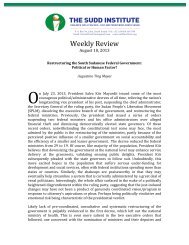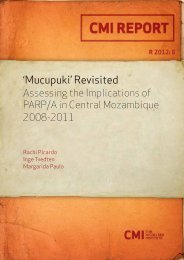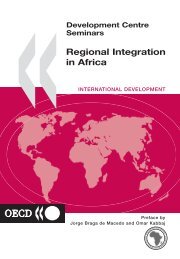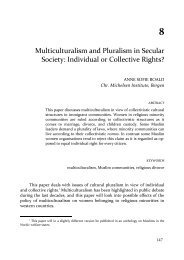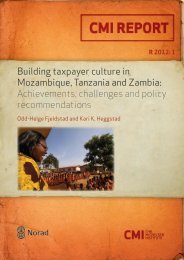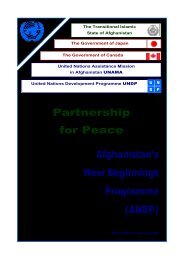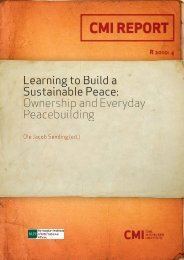Download (pdf) - CMI
Download (pdf) - CMI
Download (pdf) - CMI
Create successful ePaper yourself
Turn your PDF publications into a flip-book with our unique Google optimized e-Paper software.
<strong>CMI</strong> REPORT DECENTRALISATION AND GENDER R 2008: 9<br />
1. Introduction<br />
By Liss Schanke, Siri Lange, and Lesley Saunderson<br />
This report is a presentation of the PMO-RALG initiative “Gender and Decentralisation. Looking at<br />
Coordination and Cooperation in LGAs on maternal health”, which the Norwegian Embassy has<br />
supported since May 2006. The project ended mid-2008, coinciding with the close of LGRP. By<br />
then twelve districts had been involved in the project.<br />
Chapter two of the report describes the background for the project, former Norwegian-Tanzanian<br />
initiatives in the field, project approach, objectives, and limitations. The section also gives some<br />
general background to decentralisation by devolution in Tanzania and briefly describes the various<br />
project activities. Chapter four presents the findings from visits to the five case study councils: Ileje<br />
DC, Misungwi DC, Moshi DC, Serengeti DC, and Pangani DC. The chapter draws on a report that<br />
was circulated among stakeholders in Tanzania in 2007 (unpublished). Finally, chapter five<br />
summarises the observations and challenges for coordination and cooperation on gender issues in<br />
district councils.<br />
1.1 Project description<br />
Project approach<br />
The project has used maternal health as an example and entry point to look at coordination and<br />
cooperation within LGA. Using maternal health as an entry-point was a method to make the<br />
discussion concrete and practical - in order to avoid a general discussion on gender mainstreaming,<br />
cooperation and coordination. The strategic issues were to be in focus rather than health-issues per<br />
sé. The assumption has been that more cooperation and coordination in the field of maternal health<br />
will motivate different actors to work together and create an environment for organising around<br />
other women’s issues as well.<br />
Maternal health is an important issue for all women, families, and employers. Like many other<br />
African countries, Tanzania has great challenges in this regard:<br />
- Every hour of a day, one woman dies of pregnancy related complications.<br />
- The maternal mortality rate (MMR) of Tanzania has not gone down over the last decade. It<br />
was estimated at 578/100 000 in 2005, up from 529/100 000 in 1996.<br />
- Less than half of all Tanzanian women receive skilled attendance during childbirth.<br />
- 10 000 qualified health staff is required to fill current gaps.<br />
(NBS, 2005)<br />
Measuring the MMR in Tanzania is very complicated, since around half of all births take place<br />
outside of health facilties, and the women who do give birth at heath facilities tend to leave shortly<br />
after the delivery – when the risk for complications is still there. The district level MMR figures<br />
used in this report were provided by district authorities, and are in the majority of cases based on<br />
registered deaths at health facilties. Some districts have a system for registering deaths outside of<br />
health facilities at village level (through village health workers), and this gives more reliable data.<br />
In most cases, the MMR statistics are based on recorded data, and not on surveys. The latter result<br />
in far more accurate information.<br />
1



